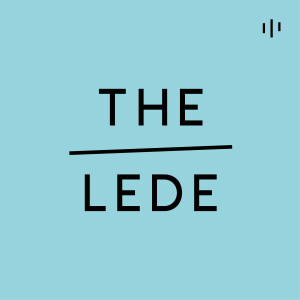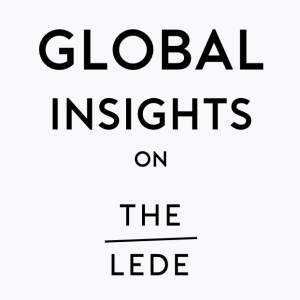Episodes

Friday Aug 16, 2024
Friday Aug 16, 2024
Ex-Pentagon adviser Jasmine El-Gamal sits down with New Lines’ Faisal Al Yafai on The Lede for a wide-ranging discussion that covers her time working as a translator during the Iraq War and at Guantanamo Bay, the unique perspective she gained working as an adviser to the Pentagon for three U.S. defense secretaries, and Joe Biden’s failures on Gaza.
Further reading: Lost and Found in Guantanamo Bay
Produced by Finbar Anderson

Friday Aug 09, 2024
Friday Aug 09, 2024
Lebanon is no stranger to conflict. For many of its citizens, a vicious 15-year civil war and a short but brutal war with Israel in 2006 are within living memory. Now, another conflict simmers on the country’s southern border with Israel and threatens every day to expand across the country.
New Lines’ Faisal Al Yafai speaks to Lebanese translator and writer Lina Mounzer to understand what the atmosphere in Lebanon is like under the threat of a new war, and political analyst Faysal Itani for his take on the geopolitical currents playing out on the Lebanese-Israeli border.
Further reading: It Felt Like Love by Lina Mounzer
Produced by Finbar Anderson

Friday Aug 02, 2024
Friday Aug 02, 2024
In 100 episodes on The Lede over five seasons, we have had the pleasure of interviewing politicians, authors, academics, thinkers, explorers and plenty of journalists. To celebrate our 100th episode, we held a live event in front of an audience to discuss how the United Kingdom is viewed from an outsider’s perspective. Our guests were the foreign correspondents Barbara Serra and Michael Peel as well as a returning panelist, satirist Karl Sharro.
Produced by Finbar Anderson

Friday Jul 26, 2024
Friday Jul 26, 2024
On this episode of Global Insights on The Lede, host Kwangu Liwewe discusses the inexorable rise of soccer stars of African origin with former Nigeria player Segun “The Mathematical” Odegbami and soccer journalist Ponga Liwewe.
Produced by Finbar Anderson

Friday Jul 19, 2024
Friday Jul 19, 2024
On this week’s episode of The Lede, host Faisal Al Yafai catches up with New Lines Politics Editor Danny Postel from Milwaukee, where Postel has been attending the Republican National Convention. Their conversation comes after a momentous week in U.S. politics that not only saw an assassination attempt on former President Donald Trump at a campaign rally, but also the announcement of Sen. J.D. Vance of Ohio as Trump’s running mate for the upcoming presidential election. Al Yafai also talks to Meredith McCarroll, author of a New Lines profile of Vance.
Further reading: J.D. Vance and the Myth of White Exceptionalism

Friday Jul 12, 2024
Friday Jul 12, 2024
On this week’s episode of The Lede, veteran journalist Mark Danner joins New Lines’ Politics Editor Danny Postel for a discussion on Donald Trump, Joe Biden and the possible autocratic future looming ahead for America.
Further reading:
The Mass Psychology of Trumpism — Watch the accompanying video hereThe United Auto Workers Rejected Trump. Members Aren’t So SureHow the War in Gaza Is Shaping the 2024 Elections — And the Future of the Democratic PartyA Deliberate Political Madness?
Produced by Finbar Anderson

Friday Jul 05, 2024
Friday Jul 05, 2024
On this episode of The Lede, veteran CNN correspondent Hala Gorani sits down with New Lines’ Faisal Al Yafai for a discussion on identity and belonging following the publication of her new memoir, “But You Don’t Look Arab: And Other Tales of Unbelonging.”

Friday Jun 28, 2024
Friday Jun 28, 2024
In this edition of Global Insights, New Lines Culture Editor Lydia Wilson sits down with host Kwangu Liwewe to discuss the upcoming election in the United Kingdom, which despite potentially heralding a change in government for the first time in 14 years, seems to be a bit lackluster.
Produced by Finbar Anderson

Friday Jun 21, 2024
Friday Jun 21, 2024
On this week’s podcast, Cambridge University academic Shruti Kapila, author of “Violent Fraternity: Indian Political Thought in the Global Age,” sits down with New Lines’ Surbhi Gupta to discuss the shock Indian election result and what it means for the future of the world’s largest democracy.
Further listening:The War on India’s Free Press — With Manisha Pande, Samar Halarnkar and Surbhi GuptaIndia’s Political Hinduism — With Nilanjan Mukhopadhyay and Surbhi Gupta
Further reading:Why the Indian Election Results Present Modi With a Defeat Within a WinThe Recent Elections Demonstrate India’s Growing Democratic Deficit
Produced by Finbar Anderson

Friday Jun 14, 2024
Friday Jun 14, 2024
While the conflict in Gaza plays out on a tiny strip of land a fraction of the size of Los Angeles, its impact on the wider Middle East region has been huge.
New Lines’ Faisal Al Yafai speaks to the Guardian’s Ruth Michaelson, Chloe Cornish of the Financial Times and independent journalist Tara Kangarlou to assess how the war has changed the political and economic landscape in Turkey, Egypt, Iran, the United Arab Emirates and Saudi Arabia.
Further listening:Living in a State of Hopelessness: On the Ground in Israel — With Lisa GoldmanOn the Ground in Gaza — With Arwa DamonIn the Firing Line — With Joumana Haddad
Further reading:The Cost of Leaving GazaHow the War in Gaza Is Shaping the 2024 Elections — And the Future of the Democratic Party
Produced by Finbar Anderson





